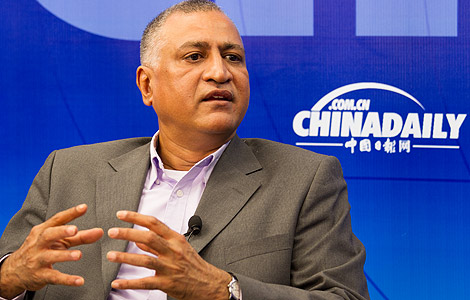Investing a nation's wealth wisely
Updated: 2013-09-30 01:21
By Chen Jia (China Daily)
|
||||||||
Different role
Last year was the fifth anniversary of its establishment and at that time the fund's board of directors reviewed and approved its 2012-16 Strategic Plan of Development, which outlines the guidelines for the CIC's overseas investment. During the meeting, the directors decided to extend the investment horizon to 10 years and adopted rolling annualized returns as an important benchmark to evaluate the performance.
Ding, the current chairman and former deputy secretary-general of the State Council, says the CIC zeroed in on the endowment model of asset allocation after looking at several such models in the past five years.
"We have developed the policy portfolio to better align and balance our strategic and tactical asset allocation, and to improve portfolio integrity, boost fiscal discipline and for prudent management."
In 2011 the company suffered a loss of 4.3 percent on its overseas investment projects, compared with a profit of 11.7 percent in 2010, raising serious doubts over its investment measures and risk control system.
A research note from Zero Power Intelligence Co Ltd, a Chinese market research firm, indicates that the CIC's returns are directly related to the performance of the global financial market. The loss in public equities and direct investment projects was the main reason for the CIC's negative return in 2011, when the MSCI World Index dropped 7.4 percent, the research note said.
The sovereign wealth fund was launched in September 2007 with registered capital of $200 billion. Of this, $90 billion was transferred to domestic financial institutions through the CIC's wholly-owned subsidiary Central Huijin Investment Co Ltd, while the balance $110 billion went for overseas investment.
Liu Shangxi, deputy director of the Research Institute for Fiscal Science under the Ministry of Finance, says that unlike other sovereign wealth funds, the State Council has clearly specified the duties and functions of the CIC. "The main task of the CIC is to manage the foreign exchange given by the central government and use it on behalf of the state to invest in overseas markets," Liu says.
About 49.2 percent of equity purchases have been from the US markets, compared with 27.8 percent in other advanced economies and 23 percent in emerging markets, the CIC annual report said. In addition the CIC has invested 22.3 percent of its fund in the overseas financial sector, while 11.6 percent is in the information technology sector and 10.7 percent in the consumer discretionary industry, it said.
Guo Tianyong, a professor at the Beijing-based Central University of Finance and Economics, says the CIC must maintain "long-term investment" and diversify risks for long-term gains. "The fund should also emphasize on talent retention and cultivation because it would help in sound growth of foreign exchange reserves," Guo says.
Although there have been some reports that the Chinese central bank and the State Administration of Foreign Exchange (SAFE) are planning to create a new institution for using the forex reserves for investments, so far, neither the central bank nor the CIC has given any such indications, experts say.
In January, SAFE launched a special office to invest foreign exchange reserves overseas in terms of entrusted loans. Most of the borrowers of such loans are enterprises that are planning overseas expansion.
"CIC faces competition from SAFE, which is also investing in equities, private equity, real estate and infrastructure to diversify China's foreign exchange reserves," says Barbary of Sovereign Wealth in London.
"Ideally, there wouldn't be two different funds attempting to fulfill the same role and an ongoing funding stream would be designated to the single fund. In that way, China might develop a fund like the Government of Singapore Investment Corp. However, given the circumstances, an endowment model is a good option for the CIC," she says.
By the end of 2012, China's total foreign exchange reserves reached $3.31 trillion. About 60 to 70 percent are dollar assets. According to the US Treasury Department, China's holdings of US Treasury bonds increased by $25.2 billion in May and the total reached a record high of $1.315 trillion. It rose by $151.9 billion from a year earlier.
Xu Hongcai, a senior financial researcher at the China Center for International Economic Exchange, a government think tank, feel that it is imperative for the CIC to diversify its investments in US Treasury bonds.
"A better choice is to invest in overseas infrastructure projects and support overseas moves of Chinese enterprises," he says.

 Visible face of CIC investment
Visible face of CIC investment
 Up, up, Huawei finds new friends in Europe nations
Up, up, Huawei finds new friends in Europe nations
 Yuxi to shield Fuxian Lake by creating wetland area
Yuxi to shield Fuxian Lake by creating wetland area
 A man with passion for China
A man with passion for China
 American batman soars through Chinese mountain
American batman soars through Chinese mountain
 Kenya mourns victims of Westgate mall attack
Kenya mourns victims of Westgate mall attack
 Home schooling popular with Chinese parents
Home schooling popular with Chinese parents
 Royal Mint coins to mark Prince George christening
Royal Mint coins to mark Prince George christening
Most Viewed
Editor's Picks

|

|

|

|

|

|
Today's Top News
50 foreign experts honored with Friendship Awards
'Reflects active opening-up strategy'
Visible face of CIC investment
Academic warns Obama on Pacific policy
NSA mapping networks of citizens
Investing a nation's wealth wisely
Little-known now, but a big future
Shanghai opens free trade zone
US Weekly

|

|







